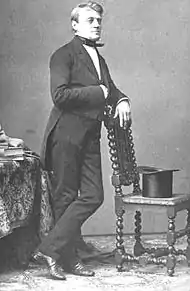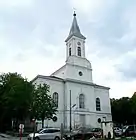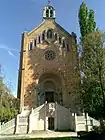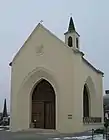
Carl Roesner in 1860
Carl Roesner (19 June 1804, Vienna - 13 July 1869, Steyr) was an Austrian architect.
Life
He studied architecture in Vienna and Rome. In 1826, he began his work as a proofreader for lectures at the Academy of Fine Arts Vienna and, in 1835, became a Professor there. He gravitated to the Romanticists and concentrated on sacred art. Wilhelm Stiassny was one of his students. He was also editor of the Allgemeine Bauzeitung (General Construction News).
As he worked during the time of the Austro-Hungarian Empire, many of his buildings are now outside Austria. A street in Vienna's Meidling district was named the "Roesnergasse" in his honor.
Selected projects
- Friedhofskapelle Pinkafeld, Pinkafeld, 1835
- Erlöserkirche, Landstraße, 1836
- Johann Nepomuk Kirche, Praterstraße, Leopoldstadt, 1841-1846
- Meidlinger Pfarrkirche, Meidling, 1845
- St. Ulrich of Augsburg Church, Smlednik (central Slovenia), 1847
- Arsenalkirche, Landstraße, 1856
- St.Josephs Kirche, Kalocsa, 1859
- Cathedral of St. Peter and St. Paul, Đakovo, begun 1866, completed by Friedrich von Schmidt and Hermann Bollé
_-_Nepomukkirche%252C_Frontalansicht.JPG.webp) St. Johann Nepomuk Church, Vienna
St. Johann Nepomuk Church, Vienna Pfarrkirche
Pfarrkirche Arsenalkirche
Arsenalkirche Friedhofskapelle
Friedhofskapelle Fountain in Gföhl
Fountain in Gföhl
Sources
Wikimedia Commons has media related to Carl Roesner.
- R. Goebl: "Roesner Karl". In: Österreichisches Biographisches Lexikon 1815–1950 (ÖBL). Vol. 9, Austrian Academy of Sciences, Vienna 1988, ISBN 3-7001-1483-4, p. 205 f. (Direct links to "p. 205", "p. 206")
This article is issued from Wikipedia. The text is licensed under Creative Commons - Attribution - Sharealike. Additional terms may apply for the media files.